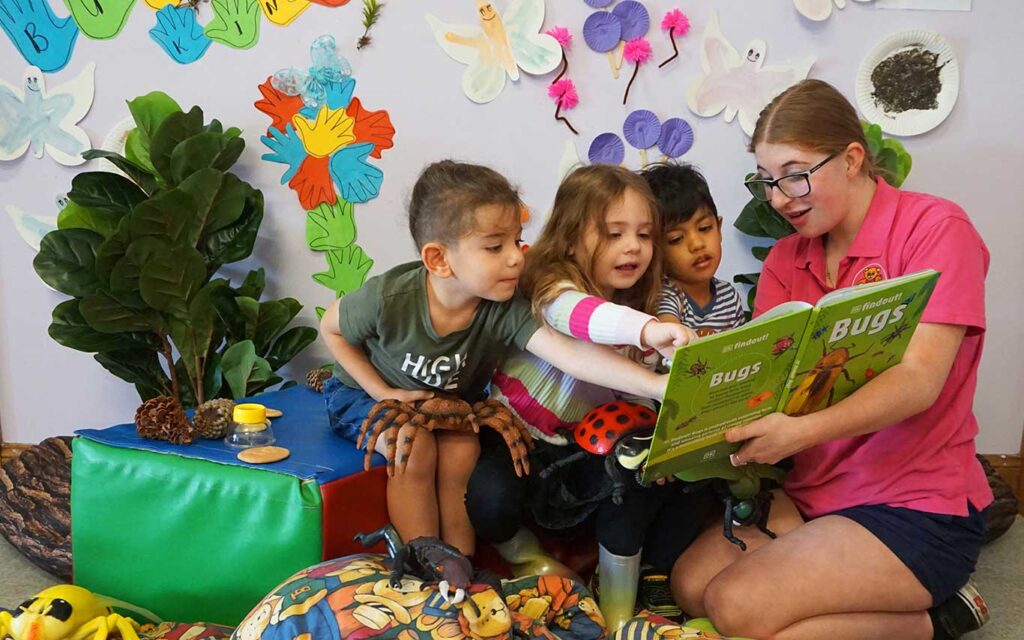

As nurturing parents, carers, and educators, we have a collective responsibility to introduce our children to as many varied, fascinating experiences and opportunities as possible. While not all these experiences require reading, nothing is more critical for their development and learning journey than literacy, and encouraging reading in early childhood is one of the cornerstones of our roles as guiding, loving adults.
Clovel Childcare strongly emphasises and champions literacy activities for young children, and this article digs deeper into the subject and our reasoning behind this focus at our award-winning early learning centres.


Choosing engaging, fun reading activities for children is key to boosting their love for reading and providing a fun, educational activity. Some creative activities to boost early literacy skills include:
These activities can make literacy learning enjoyable and interactive for young children, helping them develop essential skills and begin to grasp other concepts like numeracy and maths and science and technology playfully and engagingly.
Some young readers display very little interest in reading, but with perseverance, love, and the right strategies, this interest can be enhanced in the following ways:
During storytime, try to engage with the content by asking questions, discussing the illustrations, and encouraging youngsters to describe their feelings about the plot and what will happen next.
Modern life provides an incredible range of reading resources, from traditional books to digital stories and audiobooks. Keeping things fresh by introducing new formats helps to retain children’s interest and engage with the material.
Children are naturally predisposed to copy others, especially loving parents, guardians, and educators. If they see adults choosing to read, this provides a positive example and instils reading with ‘grown-up’ value.
If everyone in the family is reading a separate book or coming together to read one, children normalise this behaviour and will be less likely to rail against it as they grow.
Allowing children to choose their books gives them a sense of independence and ownership that makes them more likely to engage with those books. If you know your child is obsessed with dinosaurs, firefighters, or any one of a thousand subjects, there are sure to be books you can provide to promote those interests.
While pushing children into new territory to learn is essential, this is only effective if done at the right pace and can foster resentment and a feeling of failure if rushed. It is critical to create a love of reading before introducing challenging material, so start with easy books and build confidence before moving to the next level.
Regular library trips introduce children to fun reading environments and a wide range of materials, exciting them to choose new books.
As with all aspects of children’s learning, even minor achievements must be celebrated to boost confidence and encourage perseverance.
Set milestones and exciting rewards for reaching them.

As advocates of tailored, productive, and fun reading activities for children, we take great pride in our early childhood reading programs. Please contact us today, and we will gladly provide information on everything from our carefully structured, highly successful quality preschool program to our delicious, nutritious meals menu and Kindyhub, our parent/carer communication system. We also have some fascinating, informative blogs for further insight into our targeted learning approach.

Lyn Connolly is the Founder and Company Director of Clovel Childcare & Early Learning Centres, a family‑owned group of eight centres across Western Sydney established from her first service at Merrylands. Active in early childhood education since 1977, she also serves as President of the Australian Childcare Alliance (ACA) NSW, representing providers in state and federal consultations, media, and public hearings.
Regular, guided, and productive exposure to reading activities is crucial for young children’s literacy development, significantly benefitting their language acquisition, comprehension, and broader cognitive skills. The key to success lies in consistency and finding fun reading activities for children that deliver and reinforce quality content. Some guidelines regarding the recommended frequency and breakdown of reading activities are as follows:
Developing a solid reading foundation in reading and a lifelong appreciation of books is one of the most important things we can do, and there are an endless number of resources to help us.
Digital books can be a highly effective tool to engage young readers, but their effectiveness depends on the following:
Choosing your child’s childcare and early learning centre is one of the biggest decisions you will ever have to make for your child. If you have more questions for us or would like to book a tour of one of our centres, please fill out our form and we’ll be in touch!






Join our Clovel newsletter to keep up to date with the latest news, blogs, tips & advice or follow us on YouTube, Facebook and Instagram.